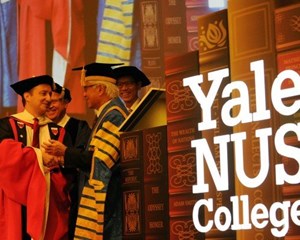Another reason to close the college was its "financial unsustainability", says Ms Chan.
陳馮富珍表示,關閉該學院的另一個原因是其“財務無法運轉”。
Yale-NUS had hoped eventually to secure as much private funding as do toptier American liberal-arts colleges, but by March had raised just a measly $320m.
耶魯大學-新加坡國立大學曾希望獲得和美國頂尖文理學院一樣多的私人資助,但到3月份僅籌集了可憐的3.2億美元。
Concern about the financial model "started the conversation" about what to do with the college, says Ms Chan.
陳馮富珍表示,對財務模式的擔憂“引發了有關如何處理這所大學的討論”。
But Pericles Lewis, the first president of Yale-NUS, who also sits on the board, notes that it had "a few years left" to achieve its fundraising targets, and could have doubled the number of students it admits.
但是耶魯大學-新加坡國立大學的第一任校長,同時也是董事會成員的伯里克利·劉易斯指出,耶魯大學還有“幾年時間”來實現籌款目標,并且本可以將招收的學生數量增加一倍。
Some professors and students suspect there were other considerations at play.
一些教授和學生懷疑還有其他因素在起作用。
Political activism is frowned upon in Singapore, which has been ruled by the same party since 1959.
新加坡自1959年以來一直由同一個政黨統治,政治激進主義在新加坡是不受歡迎的。
Yale-NUS students were more likely to express their political views and were better organised than their peers at other universities, says Cherian George, the author of a recent report on academic freedom in Singapore.
最近一份關于新加坡學術自由的報告的作者謝里安·喬治說,耶魯-新加坡國立大學的學生比其他大學的學生更愛表達自己的政治觀點,組織性也更強。
Ms Chan poohpoohs the notion that the government was keen to muzzle mouthy students. The government, she says, knew what it was signing up for when it launched the college.
然而陳女士對于“政府想要堵住多嘴學生的嘴”這一說法表示很不贊同。她說,政府在創辦這所大學的時候就知道自己要做什么。

At the opening of the new campus in 2015 Lee Hsien Loong, Singapore's prime minister, said that the college would have "to adapt the Yale model to Asia".
在2015年新校區的開幕式上,新加坡總理李顯龍表示,該學院將“對耶魯模式進行調整以適應亞洲”。
Four years later the college appeared to do just that when it cancelled a course on dissent taught by a prominent playwright because, it said, it was not sufficiently rigorous.
四年后,學院似乎就這么做了,它取消了一位著名劇作家的一門異議課程,稱其不夠嚴格。
Responding to allegations that the college had caved to political pressure, Mr Lewis conducted an investigation which yielded no evidence of government coercion.
劉易斯對于學院屈服于政治壓力的指控進行了調查,但沒有發現政府脅迫的證據。
Yet Ong Ye Kung, then the education minister, supported cancelling the course, declaring in Parliament that "political conscientisation"—when people become aware of how they are oppressed—"is not the taxpayer's idea of what education means".
然而,當時的教育部長王乙康支持取消這一課程,他在議會宣稱,“政治的意識覺醒”(當人們意識到自己如何受到壓迫時)“并不是納稅人所認為的教育的意義”。
News of the closure came as a shock to students and teachers, who were not consulted.
學校關閉的消息令學生和教師感到震驚,市政廳沒有征求他們的意見,
Neither was the college president, Tan Tai Yong, who was reportedly "gobsmacked and flabbergasted" when informed in July.
也沒有征求大學校長譚泰勇的意見。據報道,他在7月份被告知此事時“目瞪口呆”。
During the virtual town hall, microphones were muted; students had to send questions via a mediator.
在市政廳虛擬會議期間,麥克風被靜音,學生必須通過調解人提出問題。
At the end of the meeting, students could be heard shouting with frustration, according to the college newspaper.
據校報報道,會議結束時可以聽到學生們沮喪地大喊。
All they are likely to get in return for their"conscientisation" on this issue is silence.
他們在這個問題上的“意識覺醒”換來的可能是沉默。
譯文由可可原創,僅供學習交流使用,未經許可請勿轉載。











